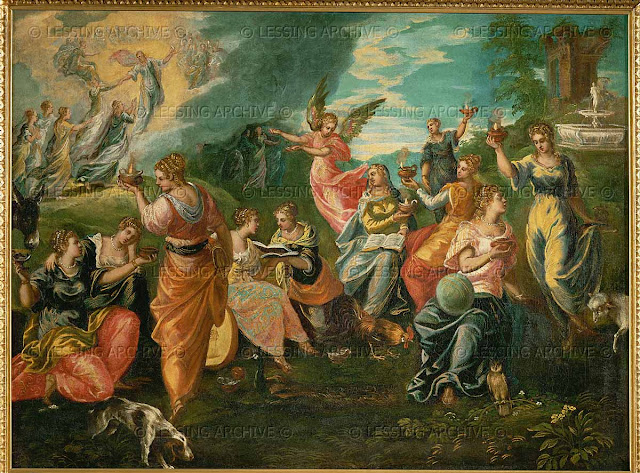This parable foretold the suddenness and unexpectedness of the Lord's coming. It calls for us to be prepared for that moment. There are four things we need to understand from the parable: the wedding, the bridesmaids, the bridegroom, and the warning.
I. THE WEDDING (v. 1)
In Biblical times, weddings were the big community event. They were the greatest social celebration. Everyone got involved: friends, families, and neighbors. They were a time of happiness and festivity. For the Arrangement of a Marriage - there were three elements in a Jewish marriage of that time. 1. The engagement 2. The betrothal 3. The wedding. So the Anticipation Before a Marriage is a long process and there was serious preparation.
II. THE BRIDESMAIDS (vv. 1-5)
a) The outward appearance - The Bridesmaids are the people who profess to be Christians.. They say they know Christ, and they anticipate His coming. They even say they are prepared for Him; they have on their wedding garment and have their lampstand. Their presence symbolizes their interest in Christ and their lampstand symbolizes their profession of faith in Christ. They all show outward marks of watching for the coming of the bridegroom: Christ. They are gathered as bridesmaids, waiting to be received into the glorious marriage celebration.
b) The inward reality - On the surface the ten bridesmaids are the same. Yet they are not the same. Verse 2 says "five of them were wise [Gk., phronimos, `thoughtful, sensible, prudent'], and five were foolish [Gk., moros, `moron, stupid']." It may not be clear which is which, but He who searches men's hearts knows (1 Sam. 16:7). The Lord reads our character and marks our place. The Lord knows them that are his, and them that are not his, in every assembly of worshippers"
Matthew 25:3-4 says, "They that were foolish took their lamps, and took no oil with them; but the wise took oil in their vessels with their lamps." The foolish had no oil, so they were not prepared for Christ's return. Their attachment to Christ was merely external. They hadn't secured the most important thing of all: the oil necessary to light the lampstand. The oil represents saving grace. In a crowd of people who outwardly appear to honor Christ will be some whose hearts are unprepared. They have not received salvation by grace.
An Unpopular Message
Throughout His ministry, Christ repeatedly warned that there will be people attaching themselves to the church who are not saved. For example, He said that in His kingdom on earth would grow both wheat and tares. He warned they would look so much alike that we are not to pull out the tares lest we pull out the wheat (Matt. 13:28-29). The separation of the two will take place when the Lord returns (v. 30).
III. THE BRIDEGROOM (vv. 6-12)
A. The Arrival - This moment in the wedding is analogous to the moment of Christ's second coming.
B. The Awakening
C. The Appeal - What did the foolish one do when they realized they had no oil? Matthew 25:8 says, "The foolish said unto the wise, Give us of your oil; for our lamps are gone out."
Lesson that we can learn – Salvation is a personal responsibility
If we're called to the judgment seat of God-- whether at death or the second coming--no one can help us. All the saints in heaven and the believers on earth could weep on our behalf but that wouldn't save us. Salvation is non-transferable. As we will see in a moment, the wise bridesmaids didn't give any oil to the foolish ones. That's not because they were selfish; it's just that an unbeliever can't ask a believer for salvation. Every person is accountable to make his own life right before God.
D. The Answer
The answer from the wise bridesmaids appears in verse 9: "Not so, lest there be not enough for us and you; but go rather to them that sell, and buy for yourselves." That the foolish bridesmaids are told to buy oil doesn't mean salvation can be bought. It's a free gift (Rom. 6:23). But there is a price: you have to give up your very self. No one can give you salvation. You have to go to God on your own. The foolish bridesmaids could have gotten oil, but not at midnight. They had the opportunity, but they slept it away. They weren't allowed to be a part of the wedding ceremony without a lit lampstand. They didn't have what was necessary.
D. The Abandoning
1. The reception & rejection into the kingdom
In verse 10 we read that while the foolish virgins went to get oil "the bridegroom came, and they that were ready went in with him to the marriage; and the door was shut." There was no place for the foolish virgins to buy oil at midnight.
The door into the kingdom is open now. But someday it will be shut. Some people will be caught unprepared. They will know the same shock as those who appear before the Lord in Matthew 7:22-23: "Many will say to me in that day, Lord, Lord, have we not prophesied in thy name? And in thy name have cast out demons? And in thy name done many wonderful works? And then will I profess to them, I never knew you; depart from me, ye that work iniquity."
IV. THE WARNING (v. 13) -The parable concludes, "Watch, therefore; for ye know neither the day nor the hour in which the Son of man cometh" (v. 13). Watch ye, therefore, and pray always, that ye may be accounted worthy to escape all these things that shall come to pass, and to stand before the son of man."

